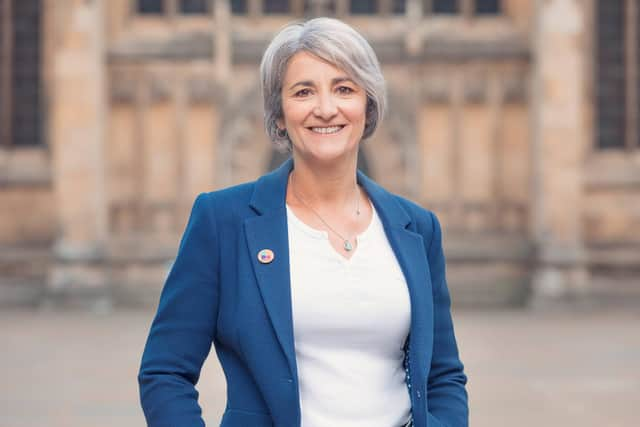How Dr Diana Taylor aims to bring prosperity to both banks of the Humber
Global connections have shaped the city’s identity and, as evidence mounts of the terrible consequences of climate change, Hull and the Humber is set to play a leading role in the global march towards decarbonisation.
Dr. Diana Taylor, the managing director of Future Humber, is an Oxford university chemistry graduate who is determined to bring jobs and investment to the region by sharing the opportunities for growth on the national and international stage. She came to Hull in 1996 as a graduate to work with BP and fell in love with the region.
Advertisement
Hide AdAdvertisement
Hide Ad"I started as a research chemist and after 14 years in technology moved into the commercial side of the business at Saltend, as Business Development Manager for the Chemicals Park,’’ she recalled.


On leaving BP, she joined Future Humber, the business membership organisation, in 2017 at a time when Hull stepped into the spotlight as the UK's city of culture.
“Culture really connects communities and it created a huge amount of pride among local people about what it means to be from Hull and the surrounding areas,” she said.
“It also showed how we could promote Hull and Humber externally to change perceptions of the region by highlighting the quality of life that can be enjoyed here.
Advertisement
Hide AdAdvertisement
Hide Ad“We aim to inspire every community around the Humber, convene every business within the Humber, to unlock the potential for innovative local growth and attract international investment.
“We want to promote the Humber as best we can and make it a great place for all to have fulfilling life experiences,’’ she added. “We are rich in assets, infrastructure and land, and spoilt with the number of reasons to live and invest here. One of the great selling points is its location.”
Future Humber aims to connect the businesses and communities in the region for a common purpose: to promote the Humber as a place to live, work, study and invest.
Hull’s merits are easy to sell, according to Ms Taylor.
She said: “We are an industrial cluster that has grown amid the UK’s busiest ports complex, now with Freeport status. We are within four hours drive of 70 per cent of the manufacturing base in the UK and ideally positioned to connect Asia all the way to the US, via the northern industrial corridor, in terms of material and product flow.
Advertisement
Hide AdAdvertisement
Hide Ad“And we are a test-bed cluster for decarbonisation; 70 per cent of the world's most successful cities are based on estuaries.
“We need to prioritise the decarbonisation of the Humber, the largest industrial cluster by far in the UK in terms of carbon emissions, to demonstrate transition to a new net zero economy, a transition that then can be replicated around the UK and the world.”
She added: “We have all the infrastructure elements needed, road, rail, waterway, airport and digital infrastructure, to accelerate connectivity across the North. However we need to unlock the full potential.”
In common with many communities across the North, businesses around the Humber would like to see rail companies raise their game.
Advertisement
Hide AdAdvertisement
Hide Ad“We want to see our train services improve,” she added. “We want it to be at a level that we feel will best serve the communities here. We are fighting to ensure the Humber is included in east-west connections. We need improved speed and frequency of connections to help the whole of the North.”
The digital infrastructure around the Humber is as strong as London, but the price you pay per square foot of office space is much lower, according to Ms Taylor.
She added: “Why wouldn’t you take advantage of that and invest here? And many have invested here. The Humber has a diverse economy, which means it has the robustness to deal with economic shocks. We are strong in so many sectors, and these work together, hand in hand, global giants to SMEs (small and medium sized enterprises) and micro businesses, creating robust supply chains throughout.”
She added: “The Humber has a supportive business environment and strong private and public sector collaboration. The strength of this collaboration is evident through investments in developments such as those announced by Siemens, such as the development of the Humber Freeport.
Advertisement
Hide AdAdvertisement
Hide Ad“What is really encouraging is that all local authorities are continuing to focus on pan-regional collaborations needed to bring together both East Yorkshire and Northern Lincolnshire for the economic prosperity of the estuary. Off our coastline we have access to huge amounts of C02 storage. We are home to eight operational wind farms, and we have demonstrated how successful our offshore wind cluster can be.
“We have £15bn private sector investment committed and ready to unlock the industrial decarbonisation projects so needed, but we do need certainty and clarity over policy from the Government. This is another industrial revolution. These investments will drive a pipeline of talent for net zero across many sectors, far wider than just in energy, touching every sector from agriculture, food and drink to healthcare.
“We need to shout about the Humber from the highest rooftops and we are doing so with a renewed confidence and ambition.”
Ms Taylor believes the Humber can lead the world towards a net zero economy and demonstrate how it could be implemented in a fair way.
Advertisement
Hide AdAdvertisement
Hide Ad“We don't want to leave anybody behind, which means every community and business, whatever size and sector, needs to be on this journey with us,’’ she said. “We are a region of extremes; our technology keeps the lights turned on in London and we can enable the UK Government to reach their net zero targets, and yet we have some of the poorest communities.”